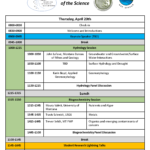
UCFWG Topic Discussion Meetings
The UCFWG is meeting the second Thursday of every month from 12pm – 1pm MST to discuss ongoing and new projects on the Upper Clark Fork River. Topics and meeting invitations are sent to interested participants via our email list. If you are interested in joining these discussions or learning more about the Upper Clark Fork Working Group please sign up for communications using the form at the bottom of this page, or by using the email link in the Navigation Menu.
UCFWG May 2023 Topic Discussion Meeting
May 11, 2023
Clark Fork River Operable Unit Strategic Plan & Clark Fork Science Forum Follow-up
The Clark Fork River Operable Unit Strategic Plan describes how Montana’s Department of Environmental Quality (DEQ) and Natural Resource Damage Program (NRDP), collectively the State, will work together to complete remediation and restoration within the Clark Fork River Operable Unit (CFROU) by 2038, guided by a 2004 Record of Decision (ROD) and several other documents described in the Strategic Plan. Remediation and restoration have been ongoing in this area since 2010. Work has been completed in seven of 22 Phases along the Clark Fork River, in residential yards and the Trestle area in Deer Lodge, and in the Eastside Road Pastures. Doug Martin will provide a brief overview of this plan, how the State will implement the remediation and restoration along the Clark Fork River, and the public comment the State is seeking on the Strategic Plan.
Following Doug’s discussion of the Clark Fork River Strategic Plan, we want to follow up on the Clark Fork Science Forum by holding an open mike session where we would like to hear from you about workshops the Working Group could help develop. Please join us and let us know about your ideas.
CLARK FORK SCIENCE FORUM
April 20th - 21st, 2023
At the Holiday Inn Downtown Missoula, MT
Join the USGS, University of Montana; MT NSF EPSCoR CREWS project, and the Natural Resource Damage Program as they host the first bi-annual Clark Fork Science Forum on the “State of the Science” at the Holiday Inn Downtown Missoula, MT, on April 20th-21st, 2023. The event will focus on Hydrology, Biogeochemistry, and Aquatic Ecology on the Clark Fork River. Professionals from federal and state agencies, academic, non-profit, and industry are welcome to participate in presentations and discussions with each other. A poster session is planned for Thursday evening, April 20th, and other opportunities are available for graduate students and research lightning talks.
UCFWG March 2023 Topic Discussion Meeting
March 9, 2023
Remediation Assessment of the Upper Clark Fork near Galen, Montana
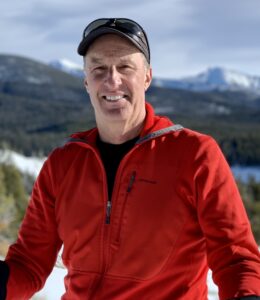
Dr. Rob Thomas is a Regents Professor of Geology at the University of Montana Western in Dillon, Montana. He received the national Carnegie/CASE Professor of the Year award in 2009 and is a fellow of the Geological Society of America. He earned his Ph.D. in geology from the University of Washington in Seattle, where he studied Cambrian mass extinctions. His current research is on the provenance, sediment transport and tectonic significance of Miocene river deposits shed off the Yellowstone thermal bulge, Cambrian sedimentation and tectonics of the Cordilleran hingeline, and sediment transport and remediation of rivers in western Montana. His international experience includes teaching mountain environments to Sherpa mountain guides at the Khumbu Climbing Center in Nepal, natural hazards at St. George’s University in Grenada, and environmental science on the global voyage of Semester at Sea. He has authored or co-authored over 75 publications, including the second editions of Roadside Geology of Yellowstone Country (2011) and Roadside Geology of Montana (2020), which was awarded the 2021 High Plains Book Award. He is a technical advisor to the Clark Fork Coalition, runs summer geology trips for Yellowstone Forever, and teaches geology field camps for the Yellowstone-Bighorn Research Association. Rob is deeply passionate about using immersion scheduling to engage students in fieldwork and playing guitar around a campfire.
UCFWG February 2023 Topic Discussion Meeting
February 9, 2023
Upper Clark Fork River Aquatic and Terrestrial Resources Restoration Plans
Doug Martin, Restoration Program Chief for the Montana Natural Resource Damage Program (NRDP), will present information on the 2023 public solicitation for restoration projects for the Upper Clark Fork River Aquatic and Terrestrial Resources Restoration Plans (Restoration Plans). In 2023, the NRDP is required to revise and update the Restoration Plans. This revision requires the solicitation of restoration project proposals from the public to potentially include in the revised plans.
In 2012 it was understood that not all aquatic or terrestrial restoration actions within the UCFRB would be known at the time of the Restoration Plans’ development. As such it is required that the Restoration Plans be reviewed, updated, and revised. As part of this revision process, NRDP is requesting restoration project proposals, from the public, to be potentially included in the revised restoration plans. Doug will discuss the public solicitation process, types of projects, guidance documents, and how to participate.
For more information also see https://dojmt.gov/lands/nrdp-public-notices/notices-of-public-comment/
UCFWG January 2023 Topic Discussion Meeting
January 12, 2023
Fluvial Geomorphic Change Since 1955
Combined remediation and restoration work along the Upper Clark Fork River between Warm Springs and Garrison (Reach A) has been guided, in part, by past channel migration rates and patterns. In Winter 2021-2022, with assistance from several Upper Clark Fork Working Group members, channel migration rates and patterns were updated to include channel and floodplain changes between 2011 and 2019. Tom Parker, Marisa Sowles, and Karin Boyd will discuss the updated analysis and observations including rates of bank erosion and deposition, trends in channel width, and possible relationships between channel changes and other variables including patterns in timing and magnitude of river flows. The results of these analyses help inform the State’s Strategic Plan for completing combined remediation and restoration work in Reach A.
UCFWG December 2022 Topic Discussion Meeting
December 8, 2022
"Open Mic" Discussion
To wrap up 2022, the December 8th, 2022 Topic Discussion Meeting will be in an “open mic” format. Members can inform one another about ongoing and upcoming projects. Bring questions you would like to pose to the group to elicit expert input. In addition, we are encouraging participants to share information on projects and ideas they are pursuing or may wish to initiate. Accordingly, please be prepared to provide a “short” description of any project(s) that you would like to make known to others or requests for information and assistance that others may be able to address.
UCFWG November 2022 Meeting
November 10, 2022
Twenty-Five Years of Walking the Clark Fork--- Some Observations
Karin will dig up some old photos and describe her journey as a contractor on Silver Bow Creek and the Clark Fork River since 1997, focusing on the evolution of fundamental approaches to restoration and remediation.
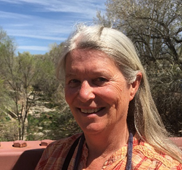
Karin Boyd, P.G. has
been working as a geomorphologist since 1988, when she was hired by a small
consulting firm in Fort Collins that had been formed by CSU faculty. She was mentored there by Stan Schumm as he
was developing the first Incised Channel Evolution Model, which has since been
expanded to better accommodate floodplain connectivity concepts (Stage 0). In 1997 she took a job with Inter-Fluve,
prompting a relocation to Bozeman. Since
2002 she has been the sole owner and employee of Applied Geomorphology, working
primarily in the northern Rockies and Washington state. Her main interests are providing geomorphic
context to all kinds of projects, as well as working with creative
interdisciplinary teams of scientists, engineers, and planners. She
has worked intermittently as a project team geomorphologist in the Clark Fork
River system for over 20 years, beginning with Silver Bow Creek remediation in
the late 1990s.
Presentation
UCFWG September 2022 Field-Trip
September 08, 2022
Warm Springs Bridge - Phase 1 Field-Trip
This month the UCFWG’s second Thursday meeting (Sep 8) will be held at the Warm Springs bridge overlooking Phase 1 at the river’s origin. For a field-trip orientation, the Montana EPSCoR project will be hosting brief in-the-field lectures from Dr. Maury Valett (UM), and NRDP Restoration Chief, Doug Martin as overviews of the remediation, restoration, and research activities associated with the UCFR. We will meet there at 12:30 pm and engage in informal interaction. All are welcome!
UCFWG June 2022 Meeting
June 09, 2022
Interactions between algal blooms and heavy metal contamination in the UCFR: Evidence of bloom dilution or productivity propagation?
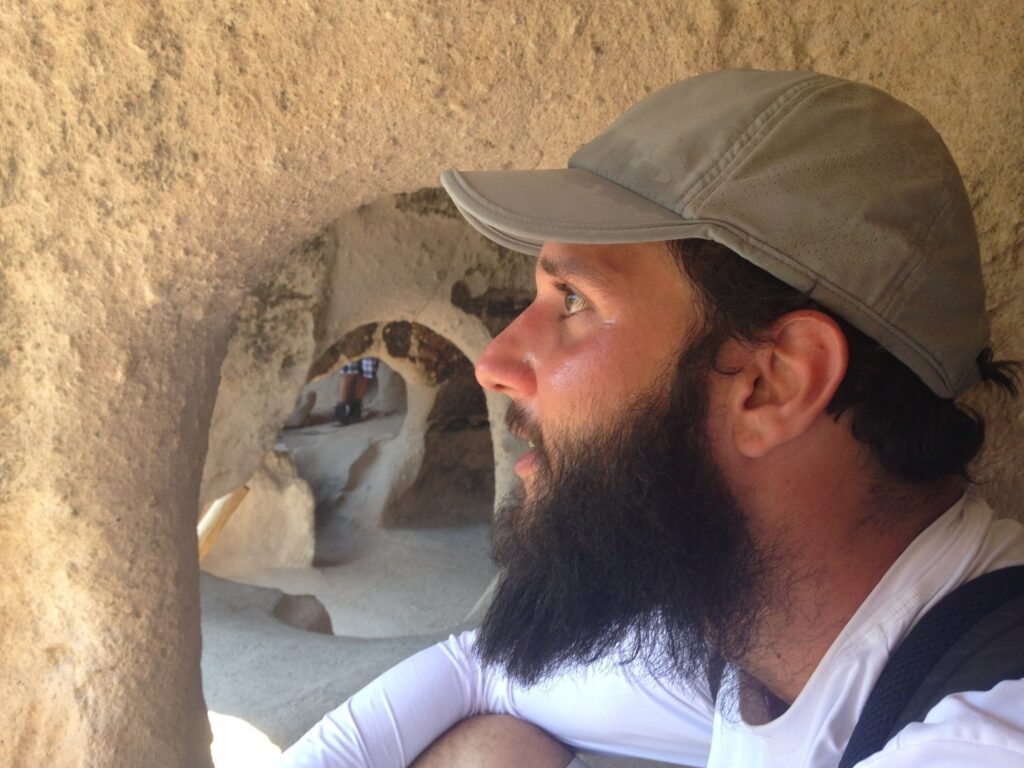
Rafael Feijo de Lima is a biologist and obtained his PhD in Brazil focusing on land use impacts on structural and functional parameters in freshwater ecosystems. He is a postdoctoral researcher in the CREWS project. His current research focuses on the linkages between ecosystem metabolism, benthic algae, heavy metal contamination and nutrient transport in the Upper Clark Fork River, Montana.
UCFWG May 2022 Meeting
May 12, 2022
Biogeochemical studies of rivers using autonomous sensors: Work in the UCFR
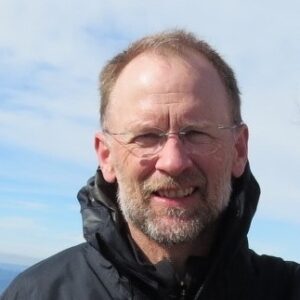
Mike DeGrandpre obtained his Ph.D. in Analytical Chemistry from the University of Washington in 1990. He carried out postdoctoral research at Woods Hole Oceanographic Institution in Massachusetts from 1990 to 1993 and held a research associate position there from 1993 through 1995. He joined the chemistry faculty at UM in January of 1996. Mike is an analytical/environmental chemist specializing in developing and using autonomous sensors to study aquatic biogeochemistry, the ocean carbon cycle, and ocean acidification.
https://hs.umt.edu/chemistry/people/default.php?s=DeGrandpre
Presentation
UCFWG April 2022 Meeting
April 14, 2022
USGS’s long term monitoring efforts on the Clark Fork and opportunities for collaboration
Melissa Schaar will be presenting virtually “USGS’s long term monitoring efforts on the Clark Fork and opportunities for collaboration” at the Upper Clark Fork Working Group Monthly Meeting, April 14 at 12:00 PM. The presentation will provide a summary of USGS’s long term monitoring efforts in the Upper Clark Fork Basin that began in 1985 to establish baseline metal concentrations in cooperation with the U.S. Environmental Protection Agency. The USGS WY-MT WSC has provided consistent long-term data at a network of sites throughout the Clark Fork Basin. The sampling was initiated in response to elevated trace-element concentrations and the designation of areas in the upper Clark Fork basin by the USEPA as National Priorities List Superfund Sites. The presentation will also highlight areas of potential collaboration and encourage an open discussion with other stakeholders and researchers in the Clark Fork Basin.
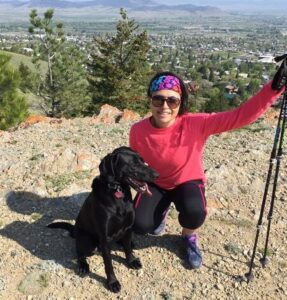
Melissa Schaar is the Project Chief for USGS’s Long Term Clark Fork Monitoring effort and new to the Wyoming-Montana Water Science Center, joining the USGS in 2021 to serve as the Groundwater and Water Quality Studies Chief. She came to the USGS with twenty years of experience working in private industry and government in the fields of hydrology, hydrogeology, geochemistry, engineering, water use, water quality, and policy. She was a Supervisory Hydrologist for the Montana DNRC, a Water Quality Standards specialist for the Montana DEQ, and a consultant for private industry. She is a Wyoming Licensed Professional Geologist. For more information on Melissa please check out Melissa Schaar | U.S. Geological Survey (usgs.gov).
Presentation
UCFWG February 2022 Meeting
February 10, 2022
"Open Mic" Upper Clark Fork Discussion
Several members of the UCFWG gave quick presentations of current research they are conducting on the Upper Clark Fork. These short presentations encouraged discussion and will influence future topic discussions in upcoming meetings. Further, it is the hope of the UCFWG directors that these discussions will influence future collaboration and networking opportunities between UCFWG members.
UCFWG November 2021 Meeting
November 18, 2021
From minerals to spinnerets: Geologic controls on water quality and aquatic-terrestrial linkages
Dr. Travis S. Schmidt, Research Ecologist USGS, will present, From minerals to spinnerets: Geologic controls on water quality and aquatic-terrestrial linkages, at the November Topic Discussion Meeting.
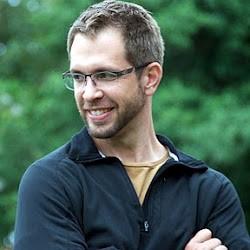
Travis Schmidt, Ph.D., is a Research Ecologist for the Wyoming-Montana Water Science Center. He has degrees from The Pennsylvania State University, Virginia Tech, and Colorado State University. He joined the USGS as a Mendenhall Fellow in 2007 and has devoted his career to understanding how stressors shape aquatic and riparian ecosystems. His work focuses on using a combination of field observations, models, and laboratory experimentation to discover how ecosystems work.
Presentation:
2021 Annual Clark Fork Basin Meeting
October 20 - 21, 2021
The USGS facilitated the Annual Clark Fork Basin Meeting inviting researchers working on the Clark Fork River to present findings and studies which they are undertaking in the Basin. The meeting was presented over two days online, hosted by Melissa Schaar, P.G. Groudwater and Water Quality Studies Chief, USGS.
Agenda
Presentations
Day 1
Day 2
UCFWG October 2021 Meeting
Oct. 14, 2021 Topic Discussion Online Zoom Meeting
Overview of ARCO Monitoring Activities and Projects
Loren Burmeister and Dave Griffis, Liability Managers Atlantic Richfield Company, will present an overview of the monitoring activities and projects ARCO is working on in the Upper Clark Fork River Basin. This will be a high-level overview of the monitoring and projects ARCO is implementing. Working Group members will have time for Q&A following Loren and Dave’s presentations.
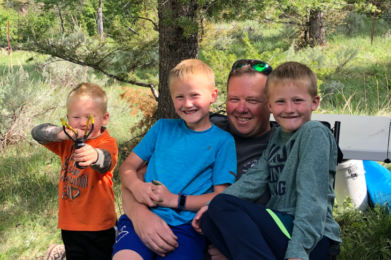
Loren Burmeister is a Liability Manager for Atlantic Richfield Company and has worked on the Clark Fork basin Superfund sites for over a decade. Loren grew up in Big Timber, graduated with a Mechanical Engineering Degree from MSU-Bozeman in 2007, and moved to Butte in 2009. His early career focused on managing remedial projects primarily in Butte and Anaconda until 2017, when he transitioned to leading settlement negotiations. Recent settlements include the Butte Priority Soils Operable Unit consent decree, Anaconda NPL partial consent decree, and several smaller agreements with local government in Butte and Anaconda.
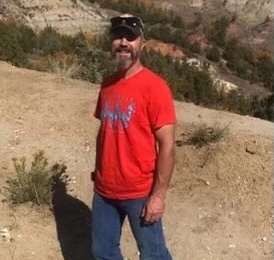
Dave Griffis is a Liability Manager with Atlantic Richfield Company with a background in Environmental Engineering and Superfund projects extending from planning/design, through construction and into long-term operation and maintenance. Dave is currently responsible for operation and maintenance of Atlantic Richfield’s water treatment systems within the Upper Clark Fork River basin. Since the early 1990’s, Dave’s work has focused on remediation and long-term, sustainable operations and maintenance of several projects in the Butte and Anaconda area which have provided experience over a wide range of disciplines during implementation.
Presentation:
UCFWG September 2021 Meeting
Sept. 9, 2021 Topic Discussion Online Zoom Meeting
Restoration Field Workshop Recap
On August 18, approximately 45 Upper Clark Fork Working Group members gathered along the Clark Fork River, split into seven inter-disciplinary teams, and observed ecosystem components that are either present or lacking at 14 different locations. At this monthly topic meeting, we will provide a summary of what the teams observed and what questions they identified, based on team summaries provided on August 18th and field forms completed by individuals. We will also provide a link to an interactive map where workshop participants can view data associated with locations they visited in the field. Finally, we will discuss questions raised by the group and how they might be pursued relative to the UCFWG’s Strategic Plan.
Presented By:
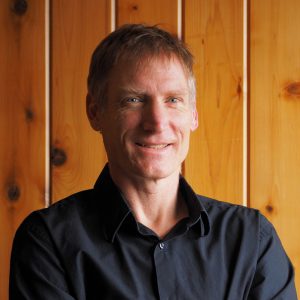
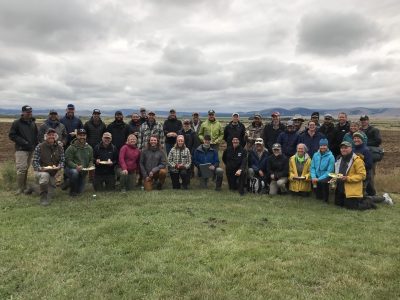
Tom Parker is the President and Principal Ecologist of Geum Environmental Consulting, Inc., founded in 2003. Since the mid-1990’s, Tom’s professional work has emphasized ecological restoration design, planning, and project implementation in river and wetland ecosystems. His projects have included large-scale river restoration, site remediation of mining impacts, wetland design, environmental compliance and permitting, and riparian restoration and management.
Presentation:
UCFWG August Restoration Field Workshop
August 18, 2021 9:30 AM - 4:30 PM BBQ Social 4:30 - 7 PM
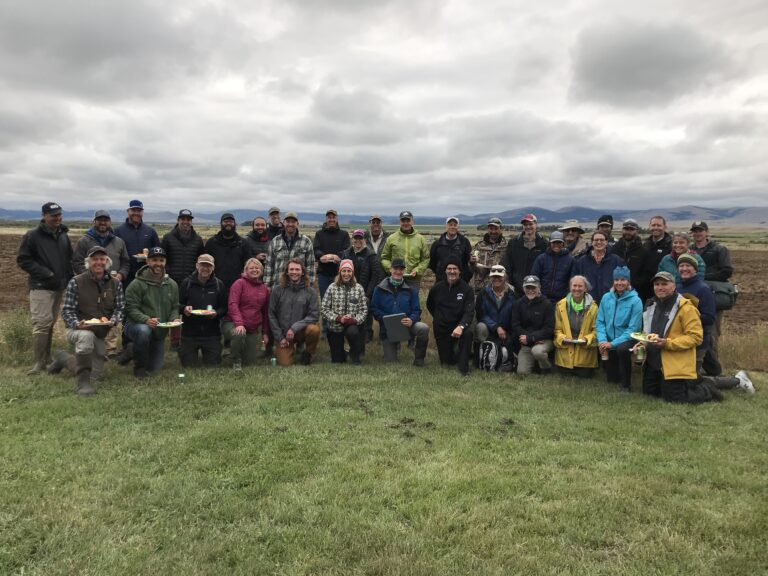
Goal: Draw upon expertise from different disciplines to improve our collective understanding of ecosystem components that are either present or lacking in reaches where remediation/restoration work has been completed, and where work has yet to be completed. Resulting information will help inform a strategy being developed to guide the nature, sequence and relative priority of remaining cleanup and restoration work.
Workshop Description:
The purpose of this workshop will be to gather a diverse group of scientists and managers who are knowledgeable about rivers and their associated ecosystems. Over the next few months, the State of Montana (DEQ, NRDP, and Fish, Wildlife and Parks) will be developing a strategy to guide how the Upper Clark Fork River and its floodplain will be cleaned up and restored. This strategy needs to be founded in science and informed by scientists and managers who understand the Upper Clark Fork River and its inhabitants, including people. By participating in this workshop, you can share your unique perspective about the river and add to a set of criteria that will form the building blocks of a comprehensive strategy to remediate and restore the Upper Clark Fork River. So please join us and bring your knowledge of varial zones, water, wildlife, food webs, algae, fish, floodplains, bugs, birds, bedrock, birches, and banks!
We will provide a bit of background; send you and your colleagues off on a field mission to observe, share and compare notes across disciplines; reconvene to piece together the story of this unique and wonderful ecosystem; and we invite you to stick around to share food, drink and friendship into the evening.
If you have trouble with registration contact Andrew Hauer, andrew.hauer@umontana.edu.
UCFWG July 2021 Meeting
July 8, 2021 Topic Discussion Online Zoom Meeting
Upper Clark Fork River Floodplain Geomorphology, Ecology, Restoration and Adaptive Management
This session will provide historic information on how the geomorphic evolution of the Upper Clark Fork River has influenced floodplain conditions and remediation strategy development. The presentations will also describe how the floodplain is responding to those strategies and how future monitoring and research can be used to improve future actions.
Presented By:
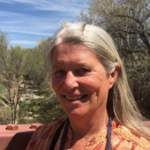
Karin Boyd, P.G. has been working as a geomorphologist since 1988, when she was hired by a small consulting firm in Fort Collins that had been formed by CSU faculty. She was mentored there by Stan Schumm as he was developing the first Incised Channel Evolution Model, which has since been expanded to better accommodate floodplain connectivity concepts (Stage 0). In 1997 she took a job with Inter-Fluve, prompting a relocation to Bozeman. Since 2002 she has been the sole owner and employee of Applied Geomorphology, working primarily in the northern Rockies and Washington state. Her main interests are providing geomorphic context to all kinds of projects, as well as working with creative interdisciplinary teams of scientists, engineers, and planners. She has worked intermittently as a project team geomorphologist in the Clark Fork River system for over 20 years, beginning with Silver Bow Creek remediation in the late 1990s.
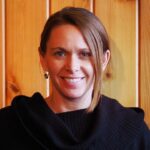
Amy Sacry is a restoration biologist with Geum Environmental and specializes in restoration of aquatic habitat, floodplains, riparian areas, wetlands and streams. She started her career as a graduate student in the University of Montana’s Riparian Wetland Research Program and as a seasonal fisheries biologist with the Bureau of Land Management, Missoula Field Office. Her main interests are working with creative interdisciplinary teams to integrate ecological structure and diversity into restoration projects at all scales. She started working on the Clark Fork River at the Milltown Dam Site in 2005 and has been a part of the project team for the integrated Upper Clark Fork River remediation and restoration work since 2010.
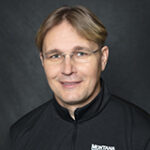
Robert Pal is an Associate Professor and the Director of Restoration at Montana Technological University (Department of Biological Sciences). He holds a master’s in agriculture and a Ph.D. in Biology/Botany. His main research focus has always been the study of the flora and vegetation of disturbed habitats. That led him to work on ecological restoration and plant invasions. He was awarded by prestigious research grants such as the Fulbright Research Grant and the Marie Curie Fellowship. Robert is in charge of the Ecological Restoration MS Program, the Restoration Certificate, and the Native Plant Restoration Program at Montana Tech. He was recently elected as vice president of the Montana Native Plant Society. Besides multiple restoration projects, he is part of several national and international research projects mainly in biological invasions.
Presentation:
UCFWG Habitat Workshop
June 11, 2021 10 AM - 3 PM
Goal: Identify key component measures of habitat diversity and coordinate field assessment efforts on the UCFR for the Summer 2021 field season.
Presented By:
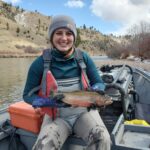
Workshop Lead: taylor.goldquiros@umontana.edu
Taylor Gold Quiros received her B.S. in Biology from Trinity University in 2016 and a M.S. in Aquatic Resources from Texas State University in 2019. She is currently a CREWS PhD student under Dr. Valett at the University of Montana, researching the influence of nutrient, metal, and habitat stressors on the fish communities of the Upper Clark Fork River.

Executive Chair: maury.valett@umontana.edu
Maury Valett is a Professor of Systems Ecology at the University of Montana. Maury’s work on streams and rivers has combined hydrology, chemistry, and biology to investigate how groundwater-surface water interaction, nutrient limitation, and biological interactions influences ecosystem structure and function. His recent research on the Upper Clark Fork River, MT, integrates work on food webs, heavy metals, and nitrogen enrichment.
Workshop Description:
Floodplain development and water withdrawals in the Upper Clark Fork River have led to decreased floodplain connectivity as well as riparian habitat loss, creating a lack of cover and reducing allochthonous input. State agencies, academic institutions, and restoration managers have vested interest in assessing the current habitat composition of the UCFR. As such, multiple research thrusts have been proposed to address habitat in the UCFR during the Summer 2021 field season. The purpose of this workshop is to identify key habitat metrics to be measured at the mesoscale-level, coordinate UCFR habitat field efforts for the Summer 2021 season and determine constructive and feasible goals for morphological habitat assessment.
Register for this Workshop or contact Taylor if you are interested in attending this workshop.
If you are looking for materials or videos related to this Workshop please contact Taylor.
UCFWG June 2021 Meeting
June 10, 2021 Topic Discussion Online Zoom Meeting
Historic and contemporary assessment of algal blooms in the Upper Clark Fork River
Presented By:
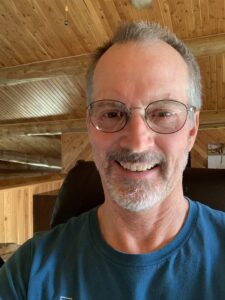
Dr. Valett is an aquatic ecosystem ecologist who has focused on nutrient influences and responses in running water ecosystems. For the past 10 years, his work has focused on collaborative efforts with the State and other organizations to understand nutrient influences on the Upper Clark Fork River (UCFR) including the potential influences of riverine algal blooms.
Presentation:
UCFWG May 2021 Meeting
May 13, 2021 Topic Discussion Online Zoom Meeting
Habitat from an Aquatic Perspective
Presented By:

Taylor Gold Quiros received her B.S. in Biology from Trinity University in 2016 and a M.S. in Aquatic Resources from Texas State University in 2019. She is currently a CREWS PhD student under Dr. Valett at the University of Montana, researching the influence of nutrient, metal, and habitat stressors on the fish communities of the Upper Clark Fork River.
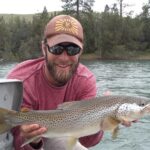
Alex is a stream restoration scientist and policy analyst based out of Anaconda, Montana, and joined CFC in 2016. He works with public resource managers, landowners, universities and the general public to design and implement restoration projects and studies that improve rivers and streams in western Montana. He spent several years working for the Forest Service as a wildland firefighter and researcher and has traveled extensively throughout the American West.
Presentation
UCFWG April 2021 Meeting
April 8, 2021 Topic Discussion Online Zoom Meeting
Functional responses of riverine food webs to multiple stressors:
mapping trophic interactions in the Upper Clark Fork across space and time.
Organized by: Rafael Feijo de Lima
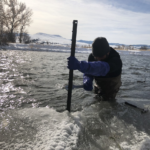
Rafael Feijo de Lima is a biologist who obtained his Ph.D. in Brazil focusing on land use impacts on structural and functional parameters in freshwater ecosystems. He is a postdoctoral researcher in the CREWS project. His current research focuses on the linkages between ecosystem metabolism, benthic algae, and nutrient transport in the Upper Clark Fork River.
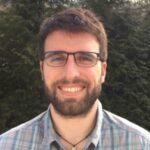
Marc Peipoch is a Research Scientist at the Stroud Water Center, PA interested in fine- and large-scale controls on ecosystem structure and function, mostly in streams, rivers and floodplains. His word addresses aggregation of ecological, physical, and biogeochemical processes within ecosystems while addressing basic and applied research.
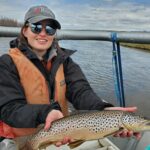
Taylor Gold Quiros received her B.S. in Biology from Trinity University in 2016 and a M.S. in Aquatic Resources from Texas State University in 2019. She is currently a CREWS PhD student under Dr. Valett at the University of Montana, researching the influence of stressors on the fish communities of the Upper Clark Fork River.
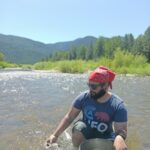
Jose A Sanchez-Ruiz received his B.S. in Biology from the University of Puerto Rico Rio Piedras in 2016 and a M.S. in Biology at Georgia Southern University in 2019. He is currently a Ph.D. student in the CREWS project under Dr. Wyatt Cross at the Montana State University. His research is focused on understanding the mining legacy on the food web structure and function in the Clark Fork River.
Presentation
Papers Referenced:
- Benke et. al. 1999, Length-mass relationships for freshwater macroinvertebrates in North America with particular reference to the southeastern United States
- Cross et. al. 2011, Ecosystem ecology meets adaptive management: food web response
to a controlled flood on the Colorado River, Glen Canyon - Hogsden and Harding 2012, Anthropogenic and natural sources of acidity and metals and their influence
on the structure of stream food webs - Neres-Lima et. al. 2017, Allochthonous and autochthonous carbon flows in food webs
of tropical forest streams - Rosi-Marshall et. al. 2015, Methods for quantifying aquatic macroinvertebrate diets
- Thompson et al. 2012, Food webs: reconciling the structure
and function of biodiversity
UCFWG March 2021 Meeting
March 11, 2021 Topic Discussion Online Zoom Meeting
The significance of a barroom napkin in establishing the restoration of Montana’s waters and rivers
Speaker: Larry Peterman, MT FWP retired
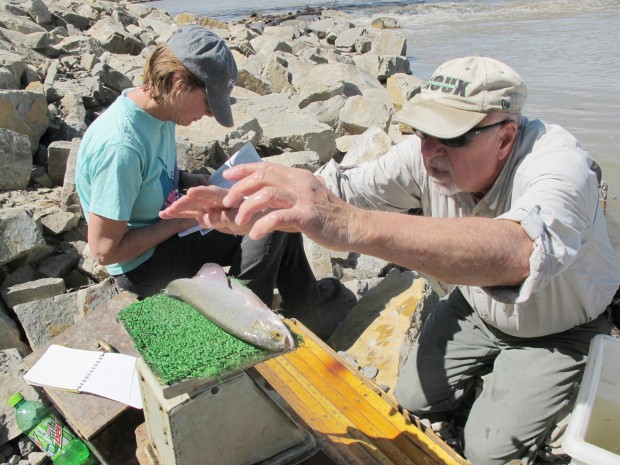
Larry Peterman began working for the Montana Fish and Game Department in 1972 and initiated work on the scientific basis for in-stream flow requirements on the Yellowstone River. His work broadened over time to include hydropower reservoir operations, small hydro evaluation, electrofishing safety, native species recovery, and fishery management plans. He became the Chief of the Fisheries Division, was promoted to Deputy Director in charge of field operations and received the Career Achievement Award before retiring in 2009. However, he remained active as an independent contractor addressing the Exxon and Bridger pipeline oil spills in 2011 and 2015. He retired again in 2016 and considers this presentation to be a monetary relapse that will be countered by a focus on Perch fishing in the future.
Presentation
UCFWG February 2021 Meeting
February 11, 2021 Topic Discussion Online Zoom Meeting
UCFR Fisheries: past and future?
Organized by Nathan Cook, MT FWP
A great deal of effort has been directed towards remediation and restoration of the Upper Clark Fork River (UCFR) with the aim to re-establish the ‘resource’. In association with these efforts, personnel from the Montana Fish Wildlife and Parks have been tackling the issues associated with the UCFR’s fisheries for decades. Recent support to Montana University System has enabled collaboration among interested parties that may lead to a better understanding of limitations and potentials. This month’s UCFR presentations provide perspectives on the UCFR fish communities and the active merging of research and management.
Meeting Presenters:
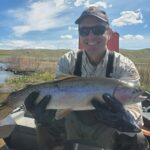
Nathan Cook: Montana FWP – Fisheries Biologist
Nathan is a fisheries mitigation biologist with Montana Fish, Wildlife, and Parks. Since 2014, his work has focused on understanding trout population dynamics and impacts of mining contamination on fish populations in the Upper Clark Fork River Basin. Nathan’s position is funded through the NRDP, an agency that works closely with FWP to prioritize and evaluate fisheries restoration actions in both the mainstem and tributaries.

Taylor Gold Quiros: PhD Student – Valett Aquatic Ecology Laboratory
taylor.goldquiros@umontana.edu
Taylor Gold Quiros is an aquatic ecology PhD student at the University of Montana. She got her B.S. from Trinity University and a M.S. from Texas State University in Aquatic Toxicology in 2018. She joined the CREWS project and Valett lab in 2019 and her dissertation work focuses on the influence of stressors on the UCFR fish community.
Presentation
UCFWG January Meeting
January 14, 2021 Online Zoom Meeting
Hydrologic complexities associated with multiple use, remediation, and restoration
Organized by Brian Bartkowiak, MT NRDP
Meeting Presenters:
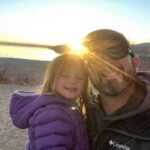
Brian Bartkowiak: Montana NRDP – Environmental Science Specialist
Brian has been involved in the remediation and restoration of the Upper Clark Fork River Basin since 1997. Brian worked for the Montana Department of Environmental Quality for 10 years, leading the remediation/restoration cleanup on the Upper Clark Fork among other projects. Brian has been with the NRDP since spring of 2018 and is responsible for the aquatic flow projects as well as restoration work on numerous watershed in the Upper Basin.

Alex Leone: Clark Fork Coalition – Restoration Policy Manager
Alex is a stream restoration scientist and policy analyst based out of Anaconda, Montana, and joined CFC in 2016. He works with public resource managers, landowners, universities and the general public to design and implement restoration projects and studies that improve rivers and streams in western Montana. He spent several years working for the Forest Service as a wildland firefighter and researcher and has traveled extensively throughout the American West.
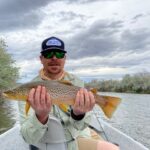
Stephen Begley, Montana FWP – Water Conservation Specialist
Stephen Begley, is a Water Conservation/Instream Flow Specialist with the Montana Department of Fish, Wildlife & Parks. Since 2012, his work has been focused on administering a number of Department owned instream flow water rights that are managed on behalf of the Public Trust. Stephen is a member of the technical committee that is focused on the implementation and administration of a set of instream flow water rights including in the Blackfoot and Clark Fork Rivers.
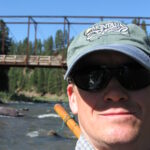
Ethan Mace: Montana DNRC – Surface Water Hydrologist
Ethan serves as the DNRC technical lead to the CSKT-MT Water Right Compact and as the State representative to the Compact Implementation Technical Team (CITT). He is also the lead for the US Forest Service Compact and work on wetland and instream water rights.
Presentations
Contact Ethan Mace, emace@mt.gov, if you are interested in the DNRC’s new web tool.
UCFWG December Meeting
December 10, 2020 Online Zoom Meeting
Metals and Biota
Organized by U of M’s Ben Colman
Meeting Presenters:

Rafael Feijo de Lima is a biologist who obtained his Ph.D. in Brazil focusing on land use impacts on structural and functional parameters in freshwater ecosystems. He is a postdoctoral researcher in the CREWS project. His current research focuses on the linkages between ecosystem metabolism, benthic algae, and nutrient transport in the Upper Clark Fork River.
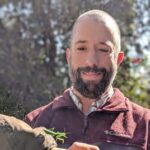
Ben Colman is an Associate Professor in the Department of Ecosystem ad Conservations Sciences at the University of Montana. Ben is interested broadly in how chemical and physical changes alter the structure and function of ecosystems, and his work in the Upper Clark Fork River focuses on the forms of metal contaminants and how that alters their interaction with the biota and their impacts.
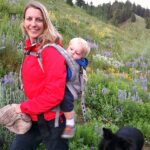
Megan Fylling has been an Avian Ecologist at the UM’s Bird Ecology Lab since 2004. Shortly after receiving her MS in 2013 at UM she became the director of several programs including a multi-partner “Bird’s-eye View Education Program” which collects scientific data and provides outreach to the public; a research project on heavy metals in riparian obligate birds; and research on migratory connectivity of songbirds using tiny tracking technology.
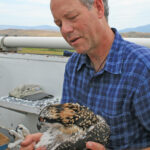
Erick Greene is a Professor of Biology and Wildlife Biology at the University of Montana. He is the director of UM’s Bird Ecology Lab and helps run the Clark Fork Watershed Education Program. With colleagues, he has monitored the levels of heavy metals in Osprey chicks in Montana for over a decade.
Presentations
Mercury in Osprey chicks in the Upper Clark Fork River – Interactive map (created by Trish Rodriguez)
UCFWG November Meeting
November 12, 2020 Online Zoom Meeting
Metal and nutrients: The Lost Creek Dutchman Complex Upper Clark Fork River, MT
The Lost Creek Dutchman Complex (LCDC) is a stream-wetland landscape that flows into the UCFR near the river’s origin. Soils across the complex are listed as moderately impacted by heavy metals as a result of historical mining activities. The LCDC contains two streams (Lost Creek and Dutchman Creek) within an extensive wetland (Dutchman wetland) comprising a mosaic of patches interacting via surface and groundwater flow. Recent research has documented that output from the LCDC can increase the nitrogen load in the UCFR from 2- to 100-fold at the point of confluence. With support from the NRDP, researchers from UM are collaborating with personnel from Geum, Inc. and other institutions to address the potential sources of nitrogen and implications of nutrient-metal interactions for the LCDC and the UCFR.
The Nov 12th UCFWG meeting will include presentations focusing on contemporary and historical conditions at the LCDC provided by Geum personnel, Tom Parker and Marisa Sowles, and an overview of ongoing biogeochemical research from UM personnel, Maury Valett, and Colton Kyro.
University of Montana
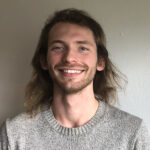
Colton Kyro is a graduate student at the University of Montana working on nitrogen dynamics in the Lost Creek Dutchman Complex (LCDC) in the Upper Clark Fork River, MT. Colton is using a combination of hydrogeologic and biogeochemical approaches to discern the origins of the nitrogen that make the LCDC a source of nutrients to the river.
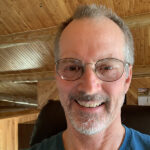
Maury Valett is a Professor of Systems Ecology at the University of Montana. Maury’s work on streams and rivers has combined hydrology, chemistry, and biology to investigate how groundwater-surface water interaction, nutrient limitation, and biological interactions influences ecosystem structure and function. His recent research on the Upper Clark Fork River, MT, integrates work on food webs, heavy metals, and nitrogen enrichment.
Geum, Inc
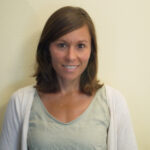
Marisa Sowels is a Water Resource Specialist at Geum Environmental Consulting, Inc. with a background in water management and wetland design. She focuses on creating or enhancing wetlands to improve water quality and habitat diversity. Marisa has worked on wetland projects in urban environments, where wetlands provide a recreational and educational component, and also in natural floodplain environments.
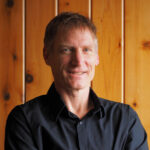
Tom Parker is the President and Principal Ecologist of Geum Environmental Consulting, Inc., founded in 2003. Since the mid-1990’s, Tom’s professional work has emphasized ecological restoration design, planning, and project implementation in river and wetland ecosystems. His projects have included large-scale river restoration, site remediation of mining impacts, wetland design, environmental compliance and permitting, and riparian restoration and management.
Presentations
UCFWG Summer Field Research Planning Meeting
March 31, 2020 Online Zoom Meeting
Hosts:
University of Montana: Maury Valett, Division of Biological Sciences
Geum Environmental Consulting: Tom Parker, Principal Ecologist.
Meeting Objectives
The purpose of this meeting is to allow representatives from each organization share upcoming activities related to the Strategic Plan.
UCFWG March 2020 Workshop
March 18, 2020 University of Montana, Missoula, MT
Due to the Coronavirus disease (COVID-19), this meeting was moved to a video conference workshop hosted by Tom Parker at Geum Environmental Engineering.
Hosts:
University of Montana: Maury Valett, Division of Biological Sciences Montana Water Consortium, Montana Institute on Ecosystems
Geum, Inc.: Tom Parker, Marisa Sowles
Meeting Objectives
Review new UCFWG.org web site and associated resources to support information sharing
- Review mental models/ working hypotheses that underlie our shared understanding of the Strategic Plan elements
- Identify purpose, roles and leadership of sub-groups
- Identify specific actions being implemented by each core UCFWG member organization in 2020
- Identify next UCFWG meeting date, location and focus
Maury Valett (UM) provided a reminder that the Strategic Plan is a living document and that modifications can and should occur as the group learns more about the Clark Fork and participates in the process of identifying goals for the Clark Fork and how we can collaboratively move towards those goals.
Doug Martin (NRDP) discussed the long-term timeframe and value of the work proposed by the Upper Clark Fork Working Group. This collaborative effort can set the groundwork for the next generation.
UCFWG October 2019 Workshop
October 18, 2019 Delta Hotel, Helena, MT
Hosts:
University of Montana: Maury Valett, Division of Biological Sciences Montana Water Consortium, Montana Institute on Ecosystems
Montana DOJ, Natural Resource Damage Program: Brian Bartkowiak
Geum, Inc.: Tom Parker, Marisa Sowles
Workshop intent and participating personnel
The Upper Clark Fork Working Group (UCFWG) is a collaborative with the mission to ‘…facilitate, produce, analyze, and share science-based knowledge among key participants involved in the remediation, restoration, research, and monitoring of the Upper Clark Fork River and its tributaries’ (UCFRWG Strategic Plan 2019).
The UCFWG is currently composed of eleven participants representing eight institutions including educational, regulatory, private business, and non-governmental organizations. The UCFWG October 2019 Workshop in Helena introduced the UCFWG to a larger audience of participating individuals and programs with 30 individuals attending the meeting. A roster of associated personnel (attending or affiliated) is provided in Appendix A of the Workshop Minutes PDF.
As part of the Oct. 2019 Workshop attendees used a large map to organize the meeting specially. On the provided map attendees posted notes which showed existing data, gaps in data, on going places being monitored, data gaps currently being researched, and action items for future research. The research group at Geum Environmental Consulting digitized the notes into GIS layers for feedback from the community.
Join the UCFWG Mailing List
Join the UCFWG email list to be informed about upcoming UCFWG meetings, events, and opportunities.
NOTE: Email may be delivered to your Junk or Spam email folder please add UCFWG emails to your safe sender email to avoid this problem. Contact Andrew Hauer, andrew.hauer@umontana.edu, with any problems.
By submitting this form, you are consenting to receive marketing emails from: . You can revoke your consent to receive emails at any time by using the SafeUnsubscribe® link, found at the bottom of every email. Emails are serviced by Constant Contact
